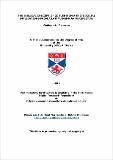Files in this item
The biblical concept of conversion and its social implications from a Latin American perspective
Item metadata
| dc.contributor.advisor | Mackie, Steven | |
| dc.contributor.advisor | Piper, Ronald A. (Ronald Allen) | |
| dc.contributor.author | Mahecha, Guidoberto | |
| dc.coverage.spatial | 308 | en_US |
| dc.date.accessioned | 2010-09-21T13:25:12Z | |
| dc.date.available | 2010-09-21T13:25:12Z | |
| dc.date.issued | 1991 | |
| dc.identifier.uri | https://hdl.handle.net/10023/1005 | |
| dc.description.abstract | This work presents a concept of conversion using the researches of Liberation theologians and the relation of Jesus to four groups in the Synoptics. In chapter one, the main concern is the hermeneutical problem as it defines the kind of emphasis the interpretation of the Bible will support. Liberation theology focuses on its context as the key aspect for a practical interpretation. In chapter two six Liberation theologians are studied with a focus on the concept of conversion. All of them criticize the type of conversion that has produced a Christianity centered on spiritual features and disregarding the Latin American situation. In chapter three the situation of Palestine in Jesus' time is described and the political, economic, and religious situation is explored. The aim of this chapter is to show that Jesus was born and lived under political, economic, and religious oppression. In chapter four the relationship of Jesus to four groups is stated. In relation to the Pharisees, two aspects are considered: that the table-fellowship of Jesus with the outcasts produced a confrontation with the Pharisees; and that, at least one time, Jesus talked about overriding the Law because of the Kingdom of God. In relation to the religious authorities, Jesus prophetically rejected the Temple and Its system. In relation to the Roman authorities, Jesus established that all things belong to God and that loyalty to any government must be relative. In relation to the rich and the poor, Jesus stressed through hard criticism of riches that the Good News are preferentially to the poor. In the conclusion, using "the relation of relationship" model of C. Boff, it is stated that the concept of conversion of Liberation theologians with social, economic and political implications, is based on the Scriptures and it is the best solution for Christianity in an oppressive situation. | en_US |
| dc.language.iso | en | en_US |
| dc.title | The biblical concept of conversion and its social implications from a Latin American perspective | en_US |
| dc.type | Thesis | en_US |
| dc.type.qualificationlevel | Doctoral | en_US |
| dc.type.qualificationname | PhD Doctor of Philosophy | en_US |
| dc.publisher.institution | The University of St Andrews | en_US |
This item appears in the following Collection(s)
Items in the St Andrews Research Repository are protected by copyright, with all rights reserved, unless otherwise indicated.

